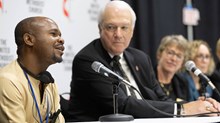Recent gestures by Burma's political leadership offer a glimpse of optimism for future reform. Still, many Burmese remain cautious as fighting continues in ethnic minority regions where most of the country's Christians are located.
The nation's military-backed leadership reached a cease-fire agreement in January with a major ethnic Karen army and freed hundreds of political prisoners. Pro-democracy leader Aung San Suu Kyi, who was released last year from 15 years of house arrest, plans to run in a parliamentary election in April.
"You can see evidences of people being joyful," said Vision Beyond Borders founder Patrick Klein, who has seen photos of Suu Kyi on billboards and t-shirts and businesses opening in Burma. "Because so much of the world is watching Burma, it's going to be a lot harder to have a sham election."
Since 1999, the U.S. State Department's International Religious Freedom report has listed Burma, which now calls itself Myanmar, as a "country of particular concern," one of a handful of countries that "engaged in or tolerated particularly severe violations of religious freedom."
In late 2011, Secretary of State Hillary Clinton visited the country, the first visit from a U.S. secretary in 50 years. The U.S. rewarded Burma's reform gestures by restoring full diplomatic relations.
Last year, the government imposed restrictions on religious activities, according to the most recent State Department report on religious liberty. Authorities privileged Buddhist monasteries over Christian orphanages in an effort to prevent Christian groups' or missionaries' influence, the report states.
Burma's upcoming election will place an international spotlight on the country, but at least 25 percent of its parliament remains reserved for military appointees, offering little hope for an overwhelming change in political leadership.
The country's president, Thein Sein, has signaled a desire to quell ethnic violence, but military violence continues against the Kachin Independence Army (many Kachin are Christians). Tens of thousands of civilians have been displaced from the region despite recent political reform.
"I'm hopeful that the opening of these small doors will result in a bigger opening," said Steve Gumaer, head of Partners Relief and Development, a Christian NGO working on the Thailand-Burma border. "Past experience makes me cautious, though. It's hard for me to be that excited when fighting keeps happening under this regime's power."
Copyright © 2012 Christianity Today. Click for reprint information.
Related Elsewhere:
Previous CT articles on Burma include:
Burma's 'Human Hope' | Activist's release signals optimism as election spurs fear. (December 9, 2010)
Burma's Christians | The country's displaced minorities maintain their distinctive faith. (November 28, 2007)
Christians and the Burmese Crackdown | A Burmese Pastor speaks on the situation of the church. (October 28, 2007)
'Destroy the Christian Religion' | Campaign against Christians presses problem with refugee resettlement. (March 14, 2007)
Burma's Almost Forgotten | Christians find themselves battered by the world's longest civil war and a brutally repressive regime. (March 1, 2004)

Support Our Work
Subscribe to CT for less than $4.25/month


















